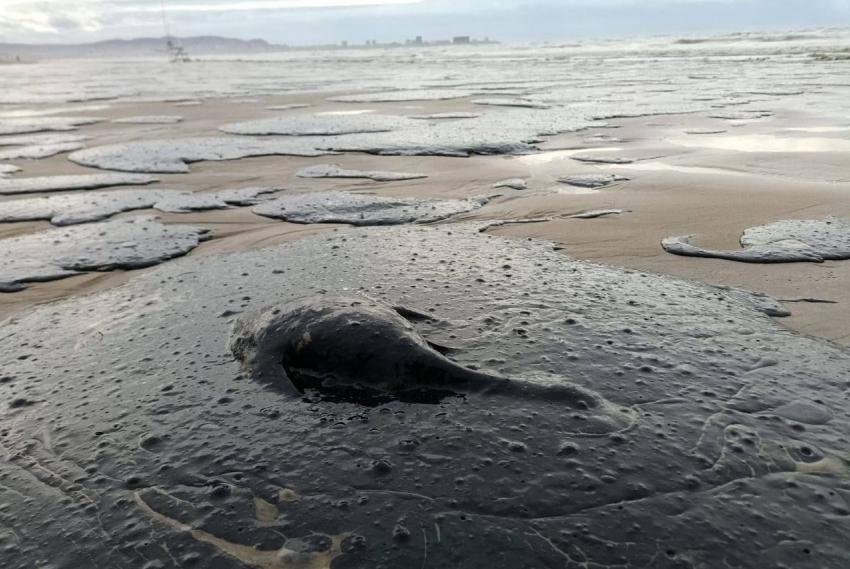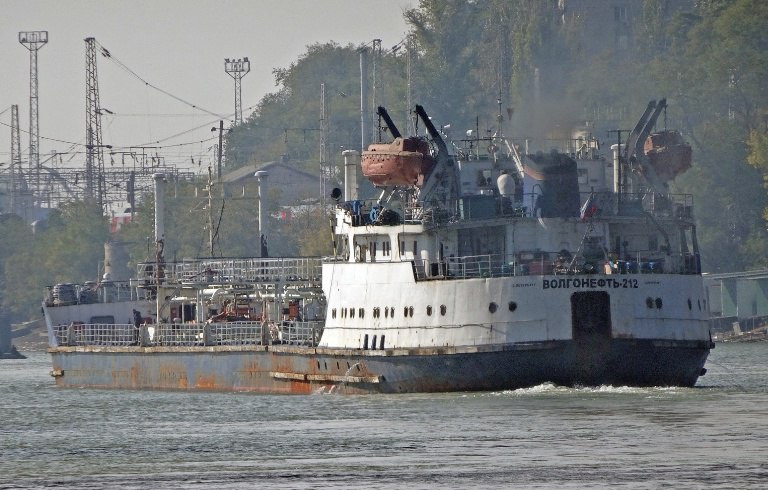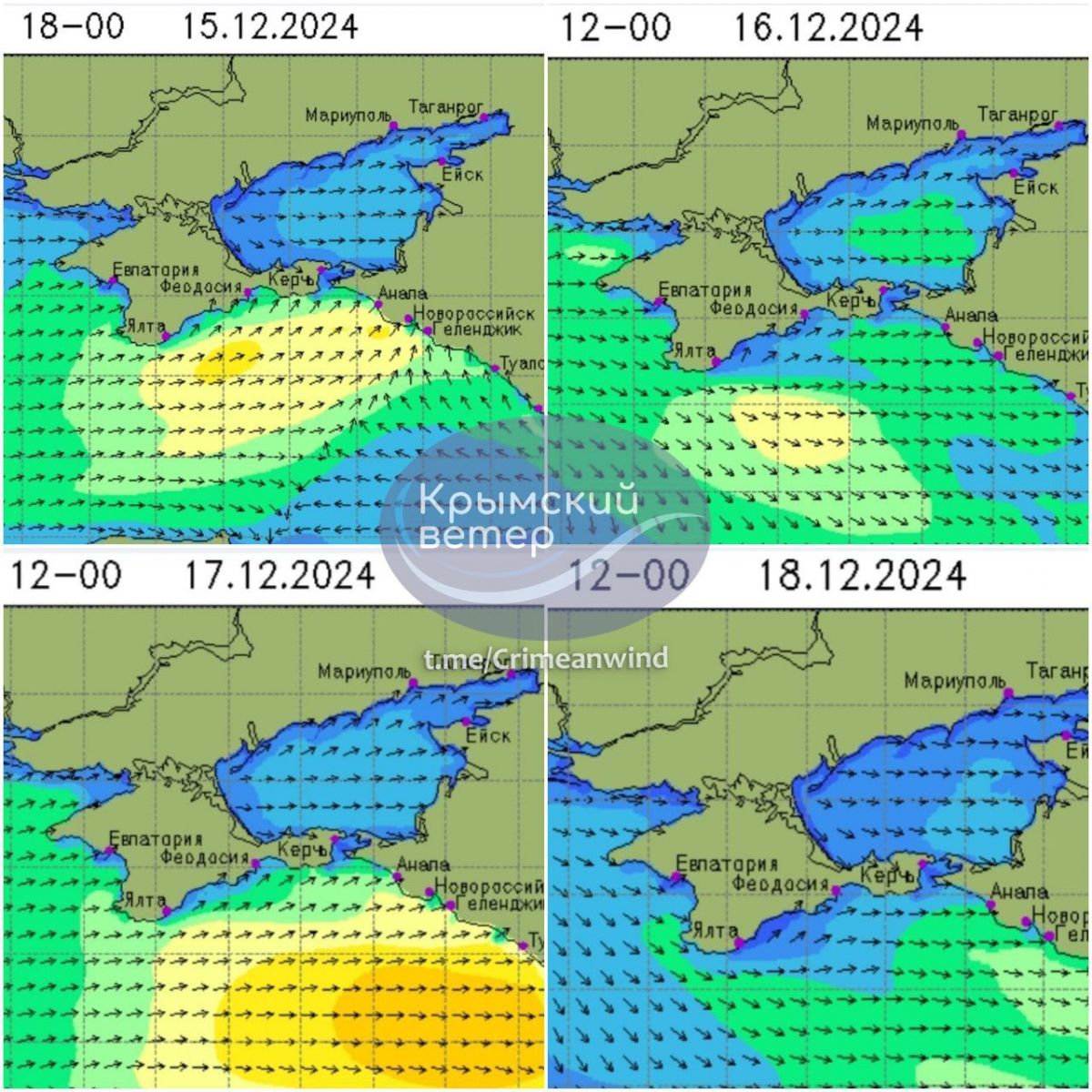"Black Tide." What happened to the Russian tankers near Crimea, and are there any threats to Ukraine?
Last week, two Russian tankers sank in the Kerch Strait. As of today, it is known that at least 3,000 tons of fuel oil have leaked, with oil slicks reaching the beaches of Krasnodar Krai (Russia), and ecologists do not rule out threats to the waters and coastline of Ukraine.
For more information about the accident and the potential consequences of this ecological disaster, see the article by RBK-Ukraine.
Accident and fuel oil spill: what happened in the Black Sea
On the morning of December 15, near Cape Takil in the southern part of the Kerch Strait, two Russian oil tankers, "Volgoneft-212" and "Volgoneft-239," sank approximately an hour and a half apart. Both vessels, carrying over 9,000 tons of fuel oil, sustained serious damage due to a storm, with wave heights reaching 2 meters and wind speeds of 24 m/s.
After the accident, the tankers ran aground near Tamani. In one of the videos shared on social media, one of them literally broke in half.
As a result, one sailor died, while 26 others were rescued. According to the official version, the sinking occurred due to crew errors and excessive loading on the hulls. The accident led to the spill of petroleum products in the waters of the Kerch Strait and likely to the largest ecological disaster in the Black Sea.
The exact volume of fuel oil in the water is unknown. The Russian government claims there was allegedly a partial leak. The Marine Hydrophysical Institute of the Russian Academy of Sciences estimates the spill at 3,000 tons.
It appears that the storm pushed the oil slicks from the occupied Crimea towards the Russian shores. By the morning of December 17, they reached the coast of Krasnodar Krai, with photos and videos of oil stains appearing on the beaches of Anapa. The local administration declared a state of emergency, with similar measures taken in the village of Blagoveshchenskaya and several settlements in the neighboring Temryuk district.

Photo: oil stains on one of the beaches in Krasnodar Krai (t.me/crimeanwind)
Today, social media is buzzing about a "black tide" in the Black Sea. Throughout the night, the slicks continued to wash ashore in Kuban, and according to eyewitnesses, in some areas, the fuel oil is lying not in patches but as a continuous layer 30 cm thick. Additionally, birds covered in fuel oil have been found on the coast, unable to fly.
It should be noted that yesterday morning, another tanker, "Volgoneft-109," sent a distress signal near the port of Kavkaz due to a crack in its hull. The vessel was carrying 4,000 tons of fuel oil, and due to the accident, the integrity of its tanks was compromised, but, as reported by Russian media, no new spill occurred.
What Ukraine says about the causes and damage
The Russian tankers sank because they violated navigation rules and went to sea despite the severe storm, stated Dmitry Pletenchuk, spokesperson for the Naval Forces of the Armed Forces of Ukraine.
"The weather conditions at that time were not suitable for them to be in open water... As always, the Russians violated everything they could," he emphasized.
According to him, the storm season in the Black and Azov Seas is ongoing and will last until mid-spring. It will be difficult to ascertain all the circumstances of the incident before that. Furthermore, these are old tankers, over 50 years old, which further confirms that the transportation of petroleum products is more important to Moscow than adhering to safety regulations, Pletenchuk added.

Photo: one of the tankers before the accident, the "Volgoneft-212" is over 50 years old (vesselfinder.com)
Although the "Volgoneft" tankers are classified as "river-sea," they are primarily used for river navigation. At most, they are meant for entering a marine bay, but they are definitely not designed for full cargo transport at sea. Moreover, they are incapable of withstanding high waves.
Concerns regarding the accident due to violations of technical requirements are also mentioned in the official statement from the Ministry of Environmental Protection and Natural Resources of Ukraine. "This is a result of Russia's disregard for international safety standards, which is typical of an aggressor," the agency noted.
This is not an isolated incident. To date, the Ukrainian side has recorded nearly 7,000 environmental crimes causing damage amounting to 3.1 trillion hryvnias. Specialists are collecting data and working on modeling the consequences of the large-scale oil spill to assess the new damage.
"According to preliminary estimates, the fuel oil leak has caused damage to the Black Sea ecosystem of more than 14 billion dollars. This figure will certainly change after the data is refined," said Minister Svitlana Grinchuk.
According to her, information will be updated based on qualitative satellite data that will be available after weather conditions improve. Additionally, a request is being prepared for the international Commission for the Protection of the Black Sea Against Pollution to conduct an independent examination of the state of the waters, bottom sediments, and marine ecosystem.
The largest ecological disaster in the Black Sea?
Both tankers were transporting fuel for the Russian fleet, and the vessel's location tracking system had been turned off for 12 days prior to the sinking. Tracking data shows that the delivery route began in Volgograd and ended in the Kerch Strait. Currently, the extent of the pollution stretches at least 60 km from the Crimean Bridge to Anapa.
"The accident involving two old tankers in the Kerch Strait, each over 50 years old, represents a serious ecological problem. The leaking fuel oil threatens the local ecosystem," noted Natalia Gozak, director of Greenpeace Ukraine.

Photo: the storm pushed the oil slicks to the Russian coast (t.me/crimeanwind)
There are grounds to say that this is the largest man-made disaster in the Black Sea. The region has already suffered from similar spills. In November 2007, another "Volgoneft" class tanker sank during a storm. Official reports indicated that between 1,200 and 1,600 tons of fuel oil entered the sea at that time. Now, the figure is at least 3,000 tons, with the likelihood that the Russian side is downplaying the actual scale.
The 2007 accident led to pollution along 10 km of the coastline on both sides of the Kerch Strait. Thousands of tons of contaminated seaweed and sand were collected. Due to the lack of facilities to process such a volume of waste collected on the Russian side, they were buried near the shore, leading to further contamination of water and soil.
The flora and fauna suffered significant harm. Heavy fractions of petroleum products settled on the seabed, destroying bottom organisms that serve as food for many fish species, such as gobies, mullet, etc. Light fractions formed a film on the surface of the sea, resulting in the death of about 12,000 birds. Severe damage was still evident a year after the accident.
Are there threats to the waters and coastline of Ukraine?
According to the Ukrainian Scientific Center for Ecology of the Sea, the current fuel oil leak will have catastrophic consequences for the Black Sea ecosystem. It will cause the death of plankton, poisoning of fish, seabirds, and other organisms due to the toxic effects of petroleum products. Pollution of the seabed and coastal areas will disrupt food chains and lead to long-term changes in the region's biodiversity. It is possible that recovery will take decades.
In an interview with "Ukrainian Radio", acting director of the Center Viktor Komorin stated that under current conditions, the fuel oil will settle on the seabed, but some portion in the form of emulsion and film will be carried over long distances.
"And it is highly likely that the southern part of the Kerch Strait is polluted with petroleum products. Why is it highly likely? Unfortunately, there is currently no satellite information about this because there is a lot of cloud cover in the region," he noted.</